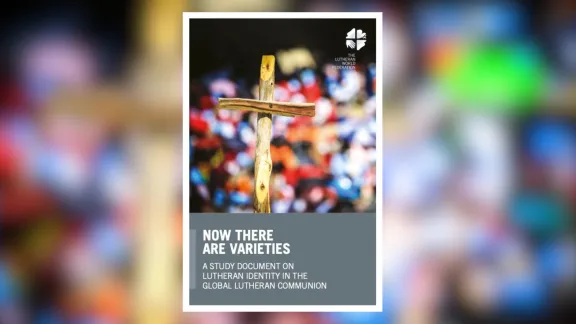The new document on Lutheran identity is the fruit of a four-year process exploring the wide variety of languages, cultures, forms of worship, spirituality, service and public witness through which that identity is expressed across the global communion of Lutheran churches.

‘Now there are varities: a study document on Lutheran identity in the global Lutheran communion’. Photo: LWF
Now there are varieties’ is the title of a new study document on Lutheran Identity published at Krakow Assembly
(LWI) - The dynamism “between maintaining unity and celebrating diversity” within the global Lutheran communion is the topic of a new study document published by the Lutheran World Federation (LWF) to coincide with the Thirteenth Assembly that took place in Krakow, Poland from 13 to 19 September.
The publication, entitled ‘Now there are varieties’, is the result of a four-year study process that brought together lay and ordained leaders, theologians and practitioners, in countries across the globe. Over 2.800 participants from LWF member churches across the world took part in the process which began with a consultation in Addis Ababa in 2019 and has produced a series of resources, including a series of videos exploring themes related to Lutheran identity, that can be downloaded and used in parish or classroom settings.
“This new publication asks what it means to be Lutheran across the world,” said Rev. Dr Sivin Kit, LWF’s Director for Theology, Mission, and Justice. “When we reflect on this with others, it deepens our self-understanding as well. Together we develop a shared identity that embodies unity in reconciled diversity in new ways.”
Just and inclusive communion
The process grew out of a call at the previous Assembly in Namibia for deeper exploration of “our shared understanding of the theological identity of LWF member churches,” while acknowledging the rich diversity of contexts within which those churches operate. Noting that it is “never easy” to hold together that diversity with a shared identity that enables churches to continue “recognizing each other belonging to the communion,” the document affirms that “the LWF’s witness as a just, inclusive and beautifully diverse communion is a gift.”
Lutherans are part of a living Christian tradition that is always reforming.
‘Now there are varieties: a study document on Lutheran identity in the global Lutheran communion’
The publication explores a “golden thread” running throughout the Lutheran identity study process which is “the gift and promise that liberates the baptized to live into the fullness of our identities, and yet binds us to one another and all creatures in the love of the Holy Trinity.” It stresses that the LWF’s call to live and work together as a communion of churches is “rooted in a shared commitment to ongoing reformation.” Lutherans are part of a living Christian tradition that is always reforming,” it insists.
The new document highlights the importance of the LWF’s witness in a context where “movements toward economic and political uniformity are on the rise and ethno-nationalist populist movements threaten to erode human rights and liberty around the world.”
Being Lutheran, “does not prescribe one identity,” the document affirms, but rather it describes “a faithful way of being in the world that points to Christ as the revelation of God’s love, while embracing the creative tensions of ecumenical consensus, interfaith dialogue and interdisciplinary dialectic.”
The publication was edited by Rev. Dr Chad Rimmer and Rev. Rivka Schunk and is freely available in English for download on the LWF website. Designed as a teaching tool for member churches, it offers reflections on “the dynamic dialogue between faith formation and cultural identity,” as well as theological explanations and practical examples of the way in which Lutherans are witnessing to their faith in a multiplicity of diverse and challenging contexts.


